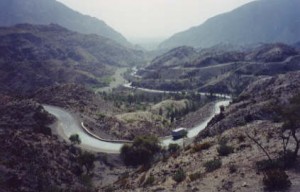Finding Alternatives to Pakistan
 The logistics of supplying a large military force in Afghanistan is a subject to which I’ve returned again and again. Afghanistan is landlocked. The people there barely have enough food to feed themselves and the country has little in the way of domestic industry to produces arms and armaments. That means that in order to supply a fighting force in Afghanistan everything has to be brought in, either overland through a neighboring country or by air.
The logistics of supplying a large military force in Afghanistan is a subject to which I’ve returned again and again. Afghanistan is landlocked. The people there barely have enough food to feed themselves and the country has little in the way of domestic industry to produces arms and armaments. That means that in order to supply a fighting force in Afghanistan everything has to be brought in, either overland through a neighboring country or by air.
As I’ve noted before supplying a substantial force in Afghanistan solely by air would be difficult, dangerous, and expensive. Consequently, most of the supplies for NATO forces in Afghanistan have been coming through Pakistan, a route which has been closed several times over the last few months and, as Pakistani government forces are moved from Pakistan’s border with Afghanistan to its border with India, becomes increasingly chancy.
Apparently, this isn’t lost on our military. We’ve succeeded in negotiating routes through Russia and other members of the USS-were that would allow us to supply NATO forces by a route that doesn’t go through Pakistan:
ISLAMABAD, Pakistan — The U.S. has struck deals with Russia and neighboring countries allowing it to transport supplies to American troops in Afghanistan through their territory, the head of U.S. Central Command said Tuesday.
Currently, most supplies for U.S. and NATO troops must first pass through northern Pakistan via the Arabian Sea port of Karachi, a treacherous route sometimes closed due to attacks by Islamist militants.
Opening up supply lines in the north is seen as especially important now because the United States is expected to nearly double its number of troops in Afghanistan to 60,000 over the coming year to battle a growing Taliban insurgency.
“It is very important as we increase the effort in Afghanistan that we have multiple routes that go into the country,” U.S. Gen. David Petraeus, who oversees the wars in Iraq and Afghanistan, told reporters in Pakistan.
Petraeus said he had reached transit deals with Russia and several other Central Asian states on a recent tour of the region. He gave few details, but NATO and U.S. officials have often said they were close to inking agreements with those countries to open up supply lines.
Afghan-based U.S. and NATO forces get up to 75 percent of their “non-lethal” supplies such as food, fuel and building materials via routes that traverse Pakistan, a volatile, nuclear-armed country believed to be a possible home of al-Qaida’s top leaders.
We can only speculate on the terms that were exacted for the routes. Under the circumstances supplying our troops through Iran probably isn’t on.
I don’t know whether this move signals a lack of confidence on our part with Pakistan’s reliability or, prospectively, a greater willingness on our part to put pressure on Islamabad. Whether Islamabad can or would respond to pressure is another subject entirely.
However, finding alternatives to Pakistan for supplying our troops in Afghanistan is a Good Thing.





